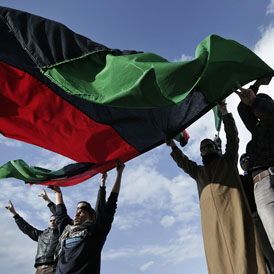The revolutionary sparks that set Libya aflame
Nowhere across north Africa and the Middle East have the Arab uprisings sparked the violence seen in Libya. A frequent visitor to Libya, Mike Hobbs, reflects on whether we should have seen it coming.

I visited Libya seven times between May 2009 and March 2010, for periods of up to a fortnight.
In total I spent around twelve weeks there, usually in the company of the educated middle classes, working as a freelance consultant facilitator for a development programme on behalf of the London School of Economics, preparing Libyans to help implement change. Am I at all surprised by what has happened?
Anyone who claims they predicted these events is probably bluffing. The Gaddafi regime appeared deeply embedded in the affairs of the people and the national psyche. Moreover, in many ways things were improving. The flood of oil and gas money into the country was ensuring that living standards for some, if by no means all, were rising.
There was a palpable air of excitement around the cities. Change really did seem to be coming.
I spoke to many Libyans, both on the programme (which was teaching them the benefits of western civil administration and democratic leadership) and from elsewhere – mostly men but some women – to find out more about this. I was interested to discover whether these changes were likely to be permanent or were just cosmetic.
Results were mixed. Several people told me that, ten years before, they’d have been unable to speak to me as a westerner; five years before, they’d have been unable to speak so freely; and now, they were able to converse as they wished.
This was not a universal reaction. Some, who either had sound reasons or longer memories, were more reluctant to talk and, if they did, made sure it was in private. It was clear the thaw was not yet complete.
I never asked whether people supported Gaddafi or were against him. This would have been pushing their hospitality too far.
I never asked whether people supported Gaddafi or were against him. This would have been pushing their hospitality too far. My impression was of a roughly even split although I suspect many business people are now keeping on the sidelines as much as possible.
The Libyans I met were bright, friendly, well-educated and fully aware of what’s going on in the world. Most had travelled to the USA, the UK and other European countries to receive further education. They were anxious for change because they knew Libya’s administration and infrastructure had a lot of catching up to do. I gathered they hoped this change would be gradual and peaceful.
However, they did often remark that such change might be too gradual, and that the Libyan propensity to take things slowly could restrict progress.
Despite this caveat, Libya seemed to be a boom state. Yet there was still a scarcely-expressed tinge of dissatisfaction, possibly brought on by observation of the freedom westerners seemed to enjoy.
Many of the trappings of western capitalism were present in the cities. Mobile phones were everywhere and there were growing numbers of iPods and laptops: the appetite of Libyans for new technology is enormous. Offset against that was a certain chaos – it once took me twelve days to find a printer that would work in conjunction with my own laptop.
Revolutions tend to occur, not at times of greatest privations, but when reforms have begun and living standards have been rising. To an extent Libya follows this model.
Obviously it was the uprising in Tunisia, echoed by the explosion of popular protest in Egypt and Bahrain, which was the spur to Libya’s revolution. But these sparks would have caused no conflagration if there had not been a receptive audience. Tribal differences have played a part but the natural inclination of the young to want change may have been just as influential.
Mike Hobbs in a freelance journalist.